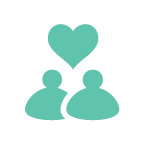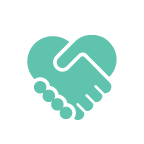
Finding a complementary partner is a key-driver towards our happiness. Ending up with a non-suitable partner, on the other hand, delivers an adverse effect.
A partner gives us access to sex which can potentially result in a family of our own. The need for sex is nuanced though: it can actually have a negative impact on relational well-being.
Many studies also suggest that ‘marriage’ renders people happier than other couples or singles. That conclusion may very well be a bridge too far as other variables come into play which aren’t measured in these studies.
Having a partner also positively impacts other dimensions, mainly of our security related needs.

Human beings look to be part of a group, and our families are often considered to be most important.
Families drive our quality of life. Receiving support from our families significantly supports our well-being as do strong relationships with “attachment” figures such as our parents, both when we are children and adolescents.
When children become parents, life tends to become a tad more complicated. First-time parents may see a decline in their well-being for a couple of years.
Obviously, family goes beyond the nucleus of the parent-child relationship and touches upon many dimensions. The relationship with siblings, if there are any, is important as well. It is interesting to note that the gender of the sibling seems to impact on our emotional well-being: having sisters enables us to express feelings, while having brothers seems to drive the opposite effect.

It may not be a surprise that having a set of dependable friendships is another important element for a high-quality life. Having a number of friends even impacts on our health and life expectancy.
The process of becoming friends is complex to say the least. It depends upon a variety of parameters, with similarity between two individuals being the most important one. Being physical beings, we require occasional touch to build positive emotions, tied to stronger social relationships, discounting the impact of “social media only” contacts.
As for numbers, the amount of friends is not as important as the quality of these relationships, although both are correlated. Having more than five best friends seems too much to handle as is having more than twelve to fifteen “regular” friends with family size impacting on the numbers of non-family members in these groups.

It was discovered in anthropology while correlating the size of our neocortex with group size, that research shows our brain can handle between 100 and 200 significant social connections, forming candidates for our community.
Communities are most broadly defined as people with whom we have something in common, and are built on location and interest, bringing belonging and emotional safety, which are essential building blocks for a happy life.